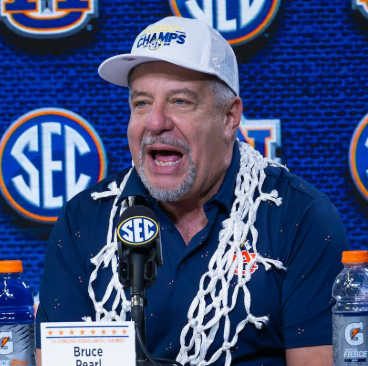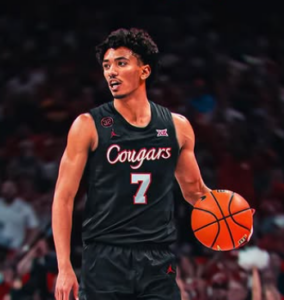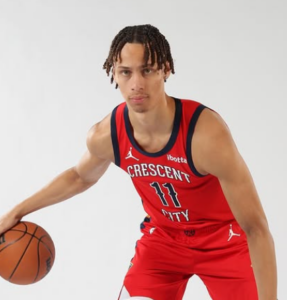Bruce Pearl’s embrace of NIL reflects his broader philosophy of empowering athletes to succeed both on and off the court
Under his guidance, Auburn has become a powerhouse in college basketball, and with the continued evolution of NIL, Pearl is poised to continue shaping the future of college sports for years to come.
Whether through his coaching or his advocacy for student-athletes, Bruce Pearl’s influence on the world of college basketball will be felt for generations.
Bruce Pearl’s 2022 comments on NIL remain relevant today as the landscape of college sports continues to change.
While the ability for athletes to profit from their name, image, and likeness represents a significant step forward, it is clear that more work is needed to establish a fair, equitable, and sustainable system.
With strong leadership and collaboration among all parties involved, the future of NIL in college sports could lead to a more balanced and transparent environment that benefits athletes while maintaining the integrity of the college sports system.
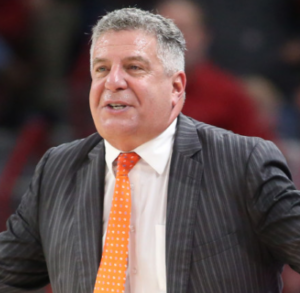
Also Read: Caroline Wozniacki Teased by Michael Phelps After Showing Her Basketball Skills with Children
Table of Contents
Bruce Pearl: College Athlete Profitability
In 2022, Auburn University’s head basketball coach Bruce Pearl shared his thoughts on the evolving issue of Name, Image, and Likeness (NIL) rights for college athletes.1
His remarks came during the SEC Spring Meetings, a time when the landscape of college athletics was shifting dramatically.
Pearl, who has been a long-time advocate for athlete rights, emphasized the importance of college athletes being able to profit from their own name, image, and likeness, particularly for those involved in revenue-generating sports.
Thank you and Ivanka for your leadership!
UAE has shown courage to support and build on the Abraham Accords. We need Rabbis, Christian pastors and Muslim Mullahs to bring us together! Rabbi Kogan would not want his murder to further divide us @MosabHasanYOSEF @YousefAlOtaiba1 https://t.co/xRdvT5j5kQ— Bruce Pearl (@coachbrucepearl) November 25, 2024
The Evolution of NIL in College Sports
For over a century, the NCAA prohibited athletes from profiting off their name, image, and likeness. The organization’s stance was grounded in the idea that amateur athletes should not benefit financially from their athletic endeavors, as doing so could undermine the integrity of collegiate sports.
However, the tides began to shift, and in 2021, the NCAA officially lifted the ban, opening the door for college athletes to profit from NIL.
This change was transformative, but it has come with its own set of challenges. With the new NIL freedoms, athletes now have the opportunity to sign sponsorship deals, promote products, and even start their own businesses.
But the lack of a standardized framework for NIL rights has created confusion and controversy across the collegiate sports world.
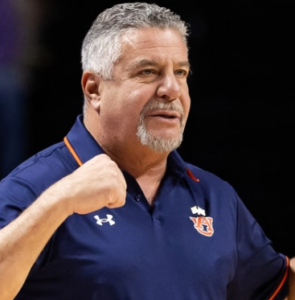
Bruce Pearl’s Call for Fairness and Clarity
- During his interview with WVTM 13 News at the SEC Spring Meetings, Bruce Pearl expressed his support for NIL and his belief that athletes in profitable sports should have the opportunity to profit from their success.2
- “Kids that are in sports that are able to be profit-making should be able to benefit from part of the profit,” Pearl said, emphasizing the need for athletes to share in the success of the sports they help generate.
- His words reflect a growing sentiment within the world of college sports: that the system should be equitable and fair.
- For years, coaches, administrators, and athletes themselves have been grappling with how to navigate the complexities of NIL rights.
- Although the NCAA’s decision to allow NIL compensation was groundbreaking, the process of figuring out how to fairly distribute profits is far from simple.
- Pearl’s comments also acknowledged the uncertainty that still surrounds NIL. “We’re all looking for guidelines and looking for, you know, trying to figure out what’s the best way to do it, what’s the right way to do it,” he noted.
- This highlights the fact that even two years after NIL rights were granted, the rules and regulations surrounding NIL are still being formed and refined.

A Landmark Change in College Athletics
The change in NIL rules was historic, marking a shift away from the traditional amateurism model that had governed college sports for over 100 years.
Athletes, many of whom are the faces of their respective sports, are now able to profit from their fame, which previously they were barred from doing.
For example, college football and basketball players, who bring in millions of dollars for their schools and the NCAA, can now secure sponsorship deals, endorsement contracts, and personal branding opportunities that were once unavailable to them.
While the ability to profit from NIL rights is a significant win for athletes, it has also raised concerns. Some critics argue that NIL could create a divide between college sports programs, with schools that can offer the most lucrative deals attracting the best talent.
Additionally, there are concerns about how this will affect the balance of power within collegiate athletics, particularly in the context of recruitment and recruitment violations.
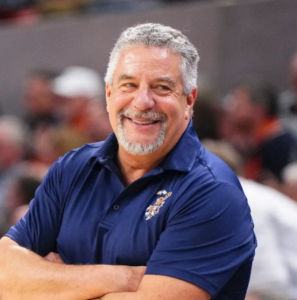
Bruce Pearl: Finding the Right Path for NIL
Bruce Pearl’s insight into the complexities of NIL rights speaks to a larger challenge: how to ensure that athletes can benefit from their own name, image, and likeness in a fair and transparent way.3
As Pearl stated, “For the kids being able to benefit from the Name, Image, and Likeness is a really good thing.” The key challenge moving forward is creating a system that not only rewards athletes but also protects the integrity of college sports and ensures fairness across the board.
One area that requires attention is the creation of more structured guidelines for NIL deals. Currently, there is no uniform standard governing how NIL deals should be structured, which can lead to exploitation or unfair deals for athletes.
Some states have enacted their own NIL laws, while others have yet to do so, which has led to discrepancies in how NIL rights are applied across different schools and regions.
The Future of NIL in College Sports
As NIL continues to evolve, it is clear that more regulation and oversight are needed. While athletes should be able to benefit from their NIL, it is also important to safeguard against the potential for abuse, whether through illegal recruiting practices, excessive commercialization, or the commodification of college athletes.
In the years to come, the NCAA and other stakeholders in college athletics will need to work together to establish a more consistent and transparent system for NIL.
This may include setting limits on the types of deals athletes can sign, creating guidelines for how schools can engage in NIL-related recruitment, and ensuring that athletes receive proper education and support when managing their NIL activities.
Bruce Pearl’s remarks on NIL highlight a critical aspect of the ongoing conversation around the future of college sports. His belief that athletes should be able to share in the profits generated by their sports is a perspective that resonates with many, especially as the revenue from college athletics continues to soar.
However, achieving fairness and equity in the NIL space will require ongoing dialogue, clear regulations, and a commitment to balancing athletes’ financial opportunities with their academic and athletic responsibilities.
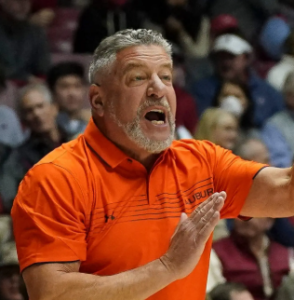
Also Read: Bruce Pearl’s Bold Claim: Why He Believes They’re the Best in College Hoops?
Bruce Pearl’s Perspective on College Athletes Monetizing Their Publicity
Bruce Pearl, the head coach of Auburn University’s men’s basketball team, is a prominent figure in college sports.
Known for his dynamic coaching style and his ability to turn programs around, Pearl’s impact on Auburn basketball has been undeniable. Since taking the helm in 2014, he has transformed the program into a perennial contender in the SEC and beyond.
His leadership has brought Auburn to the NCAA Tournament every year since the advent of Name, Image, and Likeness (NIL) in 2021.
Pearl is not only known for his coaching prowess but also for his forward-thinking stance on NIL and its benefits for college athletes. His views on NIL are both supportive and practical, acknowledging its advantages while recognizing the changes it brings to college sports.
A Coach Who Embraces Change
Bruce Pearl’s tenure at Auburn has been marked by significant success. When he arrived in 2014, Auburn was not considered a powerhouse in college basketball.
Fast forward to today, and the Tigers are consistently ranked among the top teams in the nation. Under his leadership, Auburn reached new heights, including an appearance in the Final Four in 2019.
Yet, Pearl’s success as a coach goes beyond wins and losses; he has also made an indelible mark by adapting to the rapidly evolving landscape of college athletics, particularly with the introduction of NIL.
When NIL was introduced in 2021, it fundamentally shifted how college athletes could approach their branding and financial opportunities. Pearl was quick to embrace the changes. Unlike some of his colleagues who initially hesitated to endorse NIL, Pearl understood the potential benefits it could offer to athletes.
He viewed it as an essential tool for allowing student-athletes to capitalize on their publicity, something that had long been denied to them.
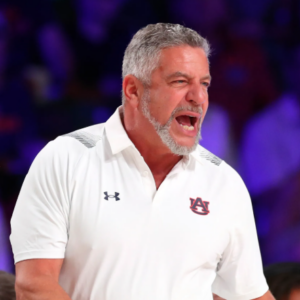
Bruce Pearl: Record-Setting Coach at Auburn
Bruce Pearl’s record at Auburn is nothing short of impressive. As of November 2024, he holds the distinction of being Auburn’s winningest coach of all time with 218 career wins.
This achievement solidifies his legacy as a legendary figure in Auburn basketball history, particularly as he continues to lead the program to new heights in a highly competitive college basketball environment.
Pearl’s influence extends beyond the court. His ability to recruit and develop talent has made Auburn an attractive destination for high school prospects and transfers alike. His coaching philosophy, which emphasizes defense, unselfish play, and a fast-paced style of offense, has resonated with athletes and fans alike.
In a competitive SEC, where programs like Kentucky, Alabama, and Arkansas consistently field strong teams, Pearl has managed to carve out a space for Auburn as a consistent contender.
NIL and College Sports: A New Era
- Bruce Pearl’s advocacy for NIL is part of a larger trend in college sports, where the financial empowerment of athletes is gaining traction.
- The introduction of NIL has transformed the college sports landscape in ways that were once thought impossible.
- Athletes now have the freedom to secure deals with companies, brands, and individuals that align with their personal values, interests, and goals.
- This shift has sparked debates about the future of amateurism in college sports, but for coaches like Pearl, it’s a necessary change that levels the playing field for athletes.
- Pearl’s progressive stance on NIL also reflects a broader cultural shift within college athletics.
- As the NCAA navigates these new waters, coaches like Pearl have become key voices in advocating for athlete rights and ensuring that student-athletes can thrive both on and off the court.
- NIL provides a powerful avenue for athletes to benefit from the value they bring to their respective programs, and Pearl’s approach is one that champions this newfound freedom.
Also Read: Steven Pearl and Brittany’s Blissful Married Life
